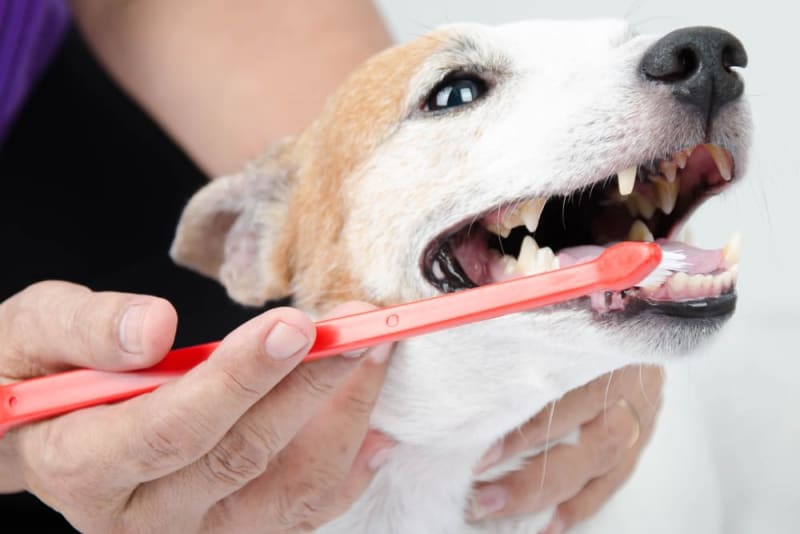Hey! So, it’s Dog Dental Health Awareness Month for our furry buddies, and we just had a quick chat with those amazing people at Bond Vet for the scoop on how to keep our dogs’ teeth and gums healthy. Stay tuned to find out how to catch dental issues with your pup and some cool tips I’ll be dropping in this post!

The most common signs of dental problem include bad breath and calculus buildup on the teeth and sometimes gingivitis, which is characterized by inflamed, red, or infected gums.
Oral health: Signs and symptoms in your dog
But what are the common signs that your pup may be having a dental problem?
So, some common signs that your dog may have dental issues are bad breath, plaque build up on their teeth, and gingivitis- basically when their gums look red, swollen or infected. Honestly, though, dental problems can show up in all sorts of ways depending on the dog and what’s actually going on with their teeth. Just keep an eye out for those signs or anything that seems a little off to you.
What else am I to look for in my dog?
The possible signs are: bad breath, yellow or brown stuff on their teeth pretty gross; gums may be red, swollen or bleeding; drooling more than usual. Avoiding a lot of food or changes in their patterns of eating; preferring one side when chewing; picking up food then dropping it; trying to scratch at their mouth; don’t want anyone touching their mouth or for someone to open it; sore mouth; or swelling or goo coming out from around their nose area. Check the broken teeth too.

Man, my dog’s breath is really bad. Do you think that’s perhaps because of some dental issues?
All in all, that is undoubtedly something that occurs constantly. However, you know, bad breath can be due to so many things – whatever your pet is chewing on, stomach problems, something stuck in the mouth, or seriously speaking, renal failures or poisoning. I would say the best thing to do is call a vet. If your pet otherwise is all right, then it is not that urgent. But if you feel you should get your pet to a vet soon, then go ahead. If your pet is very ill, sore, losing weight, can’t eat, or is showing signs of anything that might be amiss-for example, if you suspect they’ve ingested some sort of toxin-they need to go to the vet right away.
When’s the best time to think about your dog’s dental health?
It really depends on the breed and the dog for how quickly a dental problem might pop up. Your vet’s gonna hook you up with a plan that’s just right for your pup. It’s great to get your dog checked every 6-12 months, and more frequent checks if they are old or have any health issues.
I myself had a rescue dog, so I have no idea about his dental history.
So, how would you tell if they needed a trip to the dentist?
Of course you have to bring your dog to the vet for a checkup. Just like their teeth you should have a full examination of the whole dog as well because you don’t know much about your new rescue dog’s background, and there may be other health issues that need to be looked into. Your vet can let you know what’s up or maybe even tell you everything’s fine so you can chill. Is it ever too late to begin brushing a dog’s teeth?
Older animals often have dental problems. If your pet has some pretty severe dental problems, or periodontal disease, which is worse than just affecting the stuff that keeps their teeth in place, they probably won’t be thrilled with you brushing their teeth. You’ll wisely ask the vet before you try it. They can get it done by a vet, but after that, everything usually goes pretty smoothly to start this new, healthy routine.

